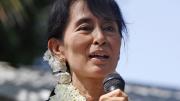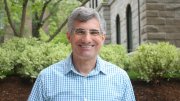Daw Aung San Suu Kyi—winner of the Nobel Peace Prize in 1991 (awarded in absentia), founder and chair of Burma’s National League for Democracy, the victim of 15 years of house arrest at the hands of that nation’s military dictatorship in the period from 1989 until November 2010, and now a member of her country’s parliament as it continues on a course toward liberalization and renewed international ties—continues her 17-day tour of the United States by visiting the Harvard Kennedy School Thursday afternoon, where she will deliver the Godkin Lecture. Admission to the lecture is by ticket, but her address will be streamed live. During the trip, she had previously been honored by the U.S. Congress and received by President Barack Obama and met with Burmese immigrants in New York City and spoken at Columbia. She is scheduled to appear as the Chubb Fellow at Yale earlier on Thursday. (Her itinerary also includes visits with Burmese immigrants in Kentucky and Indiana, and is scheduled to conclude in California.)
Check back for coverage of Aung San Suu Kyi’s Kennedy School address.
Her visit shines a light on two personal connections to Harvard, and on research conducted in Myanmar/Burma during the past two years as the country’s internal political thaw has prompted a gradual opening to the international community.
Michael Aris’s Teaching
During the first period of Aung San Suu Kyi’s house arrest in Rangoon (Yangon), from 1989 to 1995, her husband, the distinguished Tibetan scholar Michael V. Aris, was at Harvard as visiting professor of Tibetan and Himalayan studies. In 1990-1991, according to the Courses of Instruction, he taught Indian Studies 111, “The History and Civilization of Tibet and the Buddhist Himalayas,” Indian Studies 112, “Themes and Problems in the Study of Tibet and the Buddhist Himalayas,” and Indian Studies 122, 123, 132, and 133—a series of literary and colloquial Tibetan language courses. The following year, he taught a pair of Tibetan reading courses, the history and theme courses, and the language courses again. (Thanks to Leonard W. J. Van Der Kuijp, professor of Tibetan and Himalayan studies, for help in researching Aris’s teaching tenure.)
This paragraph updated 12:00 p.m. Wertham professor of law and psychiatry in society Diana L. Eck, master of Lowell House and a prominent scholar of South Asian religions, recalls that Aris lived in a faculty apartment in Quincy House, where the couple’s sons, Alexander Aris (Myint San Aung) and Kim Aris (Thein Lin), then at school in England, came to visit. (In 1991, Alexander, then 18, gave the moving Nobel Peace Prize acceptance speech in his mother’s behalf.) Michael Shinagel, dean of the division of continuing education, who was then master of Quincy House, remembers that Michael Aris “actively joined the Quincy House community, including eating meals with the students. He indicated that Harvard wanted him to stay on, but he was so devoted to the boys he felt it better to return to England.”
In 1999, Aris died of prostate cancer in Oxford, England. The Burmese government denied his request to visit Aung San Suu Kyi during his illness; she knew that if she left her country to visit him, she would be exiled permanently. Their last visit was at Christmas in 1995.
Crossing Paths in Oxford
In June, President Drew Faust received an honorary degree from Oxford University. Among the other honorands, scheduled late, was Aung San Suu Kyi, whose European trip—her first since her release from house arrest and the subsequent liberalization made it possible for her to go abroad—enabled her to deliver a much-after-the-fact Nobel Prize lecture in Oslo. It also enabled her to accept the honorary degree Oxford had conferred in 1993, when she was under house arrest. Thus, she and Faust crossed paths.
Breaking with tradition, Aung San Suu Kyi was invited to speak at the ceremony; according to the transcript, she began, “Today, many strands of my life have come together. The years that I spent as a student at St Hugh’s; the years I spent in Park Town as a wife and mother; the years I spent under house arrest—when my university, the University of Oxford, stood up and spoke up for me.”
Perhaps suggesting her interest in visiting U.S. campuses now, she said of universities and higher education:
I have often thought that the saddest thing about Burma over the last few decades has been the lack of campus life for our university students. Campus life means a life in which young people can create their own world—or make the world their own. They have the freedom and the facilities to do so. Our young people in Burma have not had this freedom for the last few decades. University life has been shattered because of a perceived need to keep students in order. That’s not possible: everybody knows that students can’t be kept in order! So we shouldn’t spend our time on such a futile and really undesirable mission. I would like to see university life restored to Burma in all its glory. And I would be so grateful if my old university, the University of Oxford, could help to bring this about once again.
I would like our young people to know what it is to feel that the world belongs to them and they belong to the world. To be able to stand at the threshold of full adulthood in full confidence that they will be able to do their best for the world and in the belief that the world also wants to do the best for them.
Oxford taught me to value humankind, because when I was in Oxford I was the only student from Burma. I think I was the only Burmese person resident in the university for the first couple of years. And all my friends were non-Burmese—of course English students, but students from all over the world, from Ghana, from India, from Thailand, from Sri Lanka, from all over the world.
And I never felt that they were different from me. We were all the same: we were all students of this university, which has some magic that makes us feel that nothing separates us—neither religion, nor race, nor nationality, nor even different levels of excellence in academic affairs. Oxford is a place of tremendous broad-mindedness. Nobody discriminates against anybody else because he or she may be different, or may not have achieved as much as others. Every human being is expected to have a value and a dignity of her kind or his kind.
And that’s why throughout the years when I was struggling for human rights in Burma I felt I was doing something of which my old university would have approved. And to feel the approval behind me has helped me a great deal.
An Emerging Research Agenda
As Burma has begun to change, scholars and staff members of the Ash Center for Democratic Governance and Innovation, at the Kennedy School, have begun to analyze the country’s severe economic problems and to recommend policy changes. Through the Rajawali Foundation Institute for Asia, which supports public-policy research, Ash Center affiliates have crafted a Myanmar Program with local partners, and have published papers on hydropower development projects with China, the pressing need for electrification, industrial policy reforms, and the urgent need to improve infrastructure and financial support for the country’s agricultural sector—suffering from decades of neglect, mismanagement, and adverse policy during the military dictatorship.
Among the Ash Center personnel involved in the research to date have been Daewoo professor of international affairs Anthony Saich (director of the Ash Center); David Dapice, economist for the center’s Vietnam program; Burbank professor of political economy Dwight Perkins; and Thomas Vallely, director of the Vietnam program.
Their early efforts may form the base for more extensive Harvard work in Burma.









